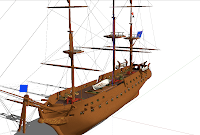
Call me an oddity among students, but I LOVE buying my new (and used) books for each semester. Except for the price, but this is not a rant about the budget of a college student.
I moseyed through each aisle reverently taking in all the textbooks, novels, and packets, gradually filling my basket with treasures. For my British Literature class: Emma by Jane Austen, Adam Bede by George Eliot, and The Norton Anthology of English Literature Vol. 2. Three beautiful books full of exquisite writing, some tears and heartache, some laughs and even more smiles. Stories of small farm towns and bustling cities, carpenters and scientists. Women and men, poems, short stories, and novels. I'm already excited for this class.
For my Statistics 121 class: The Basic Principles of Statistics, the Stats Portal CD, and the Lecture Notes all bound for me already. I'm a little nervous about this class since I haven't had math in several years. I'm okay at math- I mean, I went all the way through Calculus. But I enjoy a challenge and I'm going to work my tail off in the class.
For my New Testament class: A working blank copy of the Bible, a student packet and this beautiful book called The Four Gospels: Verse by Verse. I already know that I don't want to sell back that last book. Throughout my BYU career I've tried to have a religion class every semester and I'm finally getting to the New Testament. Plus I have Dr. Ogden!!! I have a love for the New Testament already and can't wait to
gain new insights.
For my Biology of Plants: a solitary textbook titled "Biology of Plants" with a Van Gogh painting called "
Peach Blossoms in the Crau" gracing the covers. I fell in love with this book right away with its slightly worn pages and scientific diagrams as well as it's obvious deference to nature and the beauty of plants. If this person were a book, he would be a gardener with acres of land filled w ith orchards and gardens with dozens of varieties of plants and even with some plants of his own creation. We are going to be friends- I can tell.
For my Insight Magazine staff class there are no books besides the magazine issues we critique and edit. I'm continuing on the staff from last semester and just adore this class. Sister Earl is one of my all tim favorite professors (I had her for Greats Works of Literature of WWI my freshmen year)! Plus the staff is amazing, the writing is varied and fascinating, and the creative design new and challenging. This semester we will be working hard to get the magazine to print and putting it on the web for the first time ever!
For my Islam in Contemporary Society class: No textbooks have been listed yet, but I already have my Qur'an from last year. While I'm no longer minoring in Middle Eastern Studies, I am fascinated by the Islamic religion, the Muslim culture, and their role in the world today. As a child of the 9/11 generation, 9/11 being what Kennedy's assasination was to my grandparents, I learned that the world is so much more than my American and Mormon beliefs. Rather the world is fun of distinct viewpoints and diverse cultures and I cannot call myself educated, not to mention considerate, if I do not learn about the 6 billion others I share this planet with.
That seems enough, right? Well, I was browsing the discontinued textbook shelves in hopes of finding more fascinating treasures. And I selected three books/packets that I will study independently this semester/rest of my life. They are: Human Physiology Powerpoints ( a class packet that will help to prepare me when I take that class shortly.), The Student Atlas of World Politics which I got for $2 ( a must have reference book with maps of everything from GDP to literacy rates and dependence on trade!), and finally, drum roll please, Art History in two volumes covering art from the 14th century to the 21st century. My good friend Kelly is an expert at Art and Art History and has interested me enough that I want to broaden my horizons and learn to appreciate and objectively look at art work.
Plus this semester, since learning more about
OpenCourseWare and all the schools that offer classes online I am going to look up other university's versions of the classes I'm taking. Does MIT offer a Stats class that could help me? Does John Hopkins have their Biology of Plants class online? Will I find a podcast about Islam in contemporary society from Berkley? I will keep exploring how I can supplement my education...
While I read my glorious new pile of books!

























